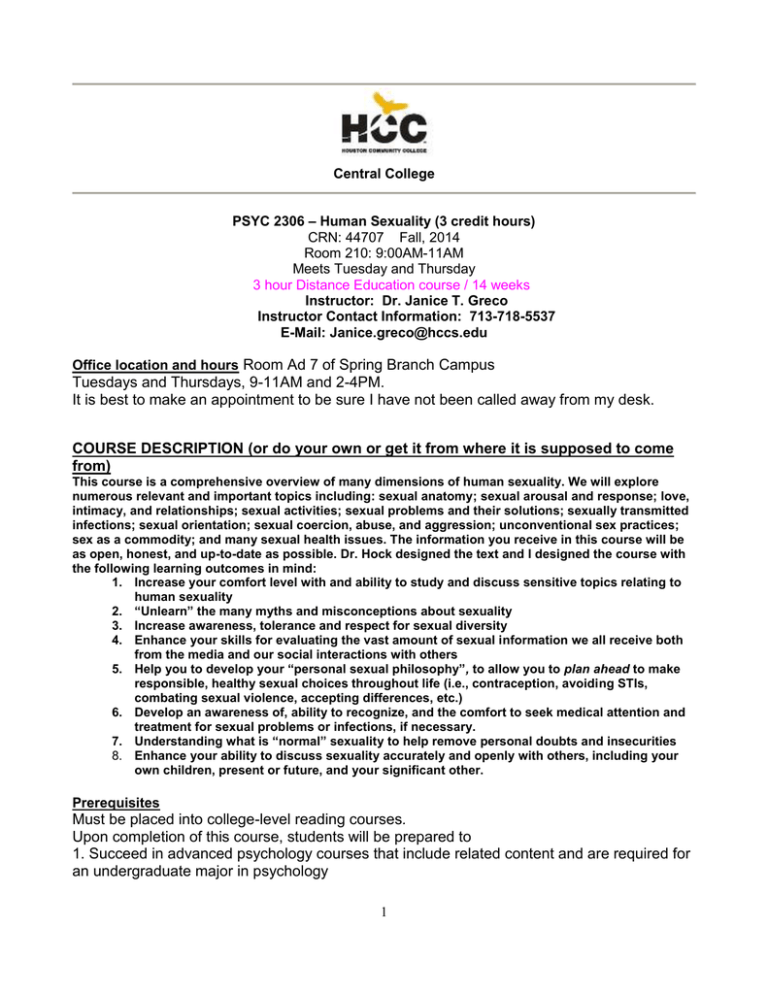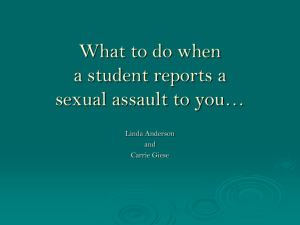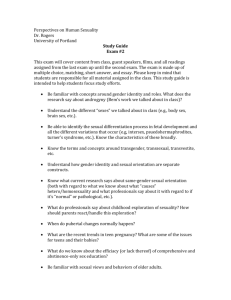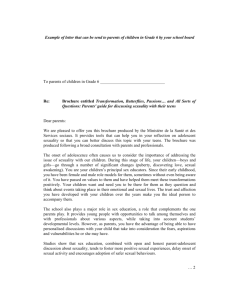
Central College
PSYC 2306 – Human Sexuality (3 credit hours)
CRN: 44707 Fall, 2014
Room 210: 9:00AM-11AM
Meets Tuesday and Thursday
3 hour Distance Education course / 14 weeks
Instructor: Dr. Janice T. Greco
Instructor Contact Information: 713-718-5537
E-Mail: Janice.greco@hccs.edu
Office location and hours Room Ad 7 of Spring Branch Campus
Tuesdays and Thursdays, 9-11AM and 2-4PM.
It is best to make an appointment to be sure I have not been called away from my desk.
COURSE DESCRIPTION (or do your own or get it from where it is supposed to come
from)
This course is a comprehensive overview of many dimensions of human sexuality. We will explore
numerous relevant and important topics including: sexual anatomy; sexual arousal and response; love,
intimacy, and relationships; sexual activities; sexual problems and their solutions; sexually transmitted
infections; sexual orientation; sexual coercion, abuse, and aggression; unconventional sex practices;
sex as a commodity; and many sexual health issues. The information you receive in this course will be
as open, honest, and up-to-date as possible. Dr. Hock designed the text and I designed the course with
the following learning outcomes in mind:
1. Increase your comfort level with and ability to study and discuss sensitive topics relating to
human sexuality
2. “Unlearn” the many myths and misconceptions about sexuality
3. Increase awareness, tolerance and respect for sexual diversity
4. Enhance your skills for evaluating the vast amount of sexual information we all receive both
from the media and our social interactions with others
5. Help you to develop your “personal sexual philosophy”, to allow you to plan ahead to make
responsible, healthy sexual choices throughout life (i.e., contraception, avoiding STIs,
combating sexual violence, accepting differences, etc.)
6. Develop an awareness of, ability to recognize, and the comfort to seek medical attention and
treatment for sexual problems or infections, if necessary.
7. Understanding what is “normal” sexuality to help remove personal doubts and insecurities
8. Enhance your ability to discuss sexuality accurately and openly with others, including your
own children, present or future, and your significant other.
Prerequisites
Must be placed into college-level reading courses.
Upon completion of this course, students will be prepared to
1. Succeed in advanced psychology courses that include related content and are required for
an undergraduate major in psychology
1
2. Succeed in advanced psychology and psychology-related courses that include related
content and are required in non-psychology majors such as nursing and education
3. Understand and evaluate psychological concepts that are covered in this course and are
featured in news reports, self-help materials, and as a part of the process of seeking and
engaging in psychotherapy
PSYC 2306 STUDENT LEARNING OUTCOMES
1: Explain the basic research and evaluation methods used in human sexuality, including the strengths and
weaknesses of each method and the specific challenges in sexuality research.
2: Define and identify key concepts in male and female reproductive anatomy and physiology, contraception and
pregnancy, including concepts, facts and theoretical perspectives.
3: Demonstrate knowledge of and explain concepts related to major social problems in sexuality: teen
pregnancy, STI infection rates, and sexual exploitation.
4: Analyze the effectiveness of different methods of sex education.
5: Apply human sexuality concepts to the solution of current issues and problems including birth control,
prevention of infection, and sexual exploitation.
6: Evaluate the significance of relationships in human sexual behavior.
STUDENT LEARNING OBJECTIVES
CORE DOMAIN 1: THE SCIENCE OF HUMAN SEXUALITY
Compare and explain
1. Scientific method
2. Descriptive methods
3. Representative sample
4. Experimental method
5. Deception
6. Survey Interview and questionnaire issues
CORE DOMAIN 1: THE MALE SEXUAL BODY
1. Define and identify: penis, penile glans, corona, penile shaft, circumcision, corpora cavernosa, corpus
spongiiosum, urethra, scrotum, testicles, gonads, testosterone, seminiferous tubules, epididymis, vas deferens,
ejaculation, anus, semen, seminal vesicles, prostate gland, urethral bulb, Cowper’s glands, pre-ejaculate
CORE DOMAIN 2: THE FEMALE SEXUAL BODY
1. Define: vulva, labia majora, labia minora, urethral opening, clitoral glans, mons veneris, clitoral hood, clitoris,
female genital mutilation (FGM), urethral opening, hymen, vaginal opening, hymenorraphy, perineum,
episiotomy, anus, breasts, areola, mammogram, vagina, G-spot, cervix, human papilloma virus (HPV), uterus,
endometrium, endometriosis, fallopian tubes, ectopic pregnancy, ovaries, estrogen, progesterone, ovarian cysts,
menstruation, menarche, menstrual cycle, ovulation, follicle-stimulating hormone (FSH), luteinizing hormone,
amenorrhea, dysmenorrheal, premenstrual syndrome(PMS), menopause, perimenopausal changes
CORE DOMAIN 3: PHYSIOLOGY OF SEXUAL RESPONSE
Define: Masters & Johnson, Excitement EPOR Model, plateau, orgasm, resolution, vasocongestion, sex flush,
tenting, emissioin, ejaculatory inevitability, expulsion, afterglow, Skene’s glands, multiple orgasms, refractory
period, Kaplan’s Three-Stage Model, desire, hypoactive sexual desire
CORE DOMAIN 4: CONCEPTION AND PREGNANCY
Explain the process of conception
List the teratogens that can interfere with prenatal development and the defects they can cause
State the arguments regarding abortion
Describe postpartum consequences of birth
Explain how impaired fertility can be treated
CORE DOMAIN 1: VIOLENCE IN SEXUAL RELATIONSHIPS
Explain: jealousy, physical abuse, emotional abuse, cycle of abuse, escaping a violent relationship
CORE DOMAIN 2: PREVENTING UNWANTED PREGNANCY
Describe different methods of contraception—condoms, female condoms, hormonal methods, pills, implants,
injections, patch, ring, emergency contraceptive pills, barrier methods, spermicides , diaphragm, cervical cap,
Lea’s shield, fertility awareness, intrauterine device surgical methods, vasectomy, tubal ligation, laparoscopy,
sterilization, immunocontraceptiven
2
CORE DOMAIN 3: SEXUAL PROBLEMS
Describe sexual problems (desire, arousal, orgasm, pain): sensate focus, masturbation, communication, touch
mirroring, self-discovery
CORE DOMAIN 4: SEXUALLY TRANSMITTED INFECTIONS
Describe sexually transmitted infections individually and collectively that will address bacterial, viral, and
parasitic infection: herpes simplex virus, hepatitis B Virus, human papilloma virus, HIV/AIDS, bacterial STI’s—
chlamydiaa, gonorrhea, nongonococal urethritis, mycoplasma genitalium, syphilis, chancroid, pelvic
inflammatory disease and parasitic STI’s—trichomoniasis, pubic lice
CORE DOMAIN 5: SEXUAL AGGRESSION AND VIOLENCE
1. Explain rape, child sexual abuse, harassment, child pornography, and trafficking
CORE DOMAIN : PARAPHILIAS
Compare coercive and non-coercive paraphilias
CORE DOMAIN 1: SEX EDUCATION
Contrast comprehensive sex education with abstinence only research findings
CORE DOMAIN 1: VIOLENCE IN SEXUAL RELATIONSHIPS
Discuss: jealousy, physical abuse, emotional abuse, cycle of abuse, escaping a violent relationship
CORE DOMAIN 2: PREVENTING UNWANTED PREGNANCY
Compare different methods of contraception—condoms, female condoms, hormonal methods, pills, implants,
injections, patch, ring, emergency contraceptive pills, barrier methods, spermicides , diaphragm, cervical cap,
Lea’s shield, fertility awareness, intrauterine device surgical methods, vasectomy, tubal ligation, laparoscopy,
sterilization, immunocontraceptiven
CORE DOMAIN 3: SEXUAL PROBLEMS
Hypothesize solutions for sexual problems (desire, arousal, orgasm, pain): sensate focus, masturbation,
communication, touch mirroring, self-discovery
CORE DOMAIN 4: SEXUALLY TRANSMITTED INFECTIONS
Create a plan for preventing sexually transmitted infections individually and collectively that will address
bacterial, viral, and parasitic infection: herpes simplex virus, hepatitis B Virus, human papilloma virus, HIV/AIDS,
bacterial STI’s—chlamydiaa, gonorrhea, nongonococal urethritis, mycoplasma genitalium, syphilis, chancroid,
pelvic inflammatory disease and parasitic STI’s—trichomoniasis, pubic lice
CORE DOMAIN 5: SEXUAL AGGRESSION AND VIOLENCE
2. Support arguments for the prevention of rape, child sexual abuse, harassment, child pornography, and
trafficking
CORE DOMAIN : PARAPHILIAS
Discuss the coercive and non-coercive paraphilias
CORE DOMAIN 1: LOVE, INTIMACY AND COMMUNICATION
Evaluate: relationships according to the Triangular Theory of Love, the value of self-disclosure in relationships,
the importance of sexual communication
CORE DOMAIN 2: HEALTHY SEXUALITY
Defend: an argument for the importance of having a health sense of self, of sexual orientation, and sexual
philosophy in health sexuality
CORE DOMAIN 3: SEXUAL PLEASURE
Choose sexual preferences to meet personal goals: fantasy, masturbation, erotic touch, oral sex, anal
stimulation, coitus
CORE DOMAIN 4: CHOOSING CHILDREN
Justify to yourself and your partner why you should or should not have children.
CORE CURRICULM COMPETENCIES
Reading: Students are required to read college-level textbooks.
Writing: Students are required to write papers and reports.
Speaking: Students are required to participate in discussions.
Critical Thinking: Students are required to employ critical thinking in developing their project
and preparing it for presentation.
Computer Literacy: Students will find it helpful to access the learning web for copies of
lecture notes online in completion of this course.
3
SEMESTER SCHEDULE
Twelve weeks----- 15 chapters ----7 units----- Four exams-----1 Paper (Case Study)
WEEK
CHAPTER
TOPICS & ASSIGNMENTS
Date
Chapte Lecture Topic/Due Dates
r
Week 1
Preliminaries, Introductions,
1 9/23
Intro Psych review-Clinical Terms
Week 2
Your sexual anatomy.
2 9/25
Week 3
The physiology of sex.
3 9/30
Sexual response.
Week
Test I review
4 10/2
Week
Test I, on chapters 1,2,3 and the Intro review
4 10/7
Week 4
Love, Intimacy and sexual communication.
5 10/9
Wk 5 5,6
Contraception and complications
10/14
Wk 5
Test II Review
10/16
Wk 6
Exam 2 (Ch. 4, 5, 6 )
10/21
Wk 6 7
Sexual Problems
10/23
Wk 7 8
Sexually transmitted infections
10/28
Wk 7 9
Conception, Pregnancy and Birthing
10/30
Wk 8
LAST DAY TO DROP, BY 4:30pm
11/4
Last
Wk 8 10
Gender expectations, roles and behaviors; culture rules!
11/4
Wk 8 11
Sexual orientation: classifications and identity.
11/6
Wk 9
Test III Review
11/11
Wk 9
Exam 3 ( Chaps 7, 8, 9 10, 11)
11/13
PAPER DUE TUESDAY, DEC 2ND.
Wk10 13,15 Sexual aggression and commercialization
11/18
4
Wk10 14
11/20
Wk11 12
11/25
15
Wk11
11/27
The paraphilias
Wk12
12/2
Wk12
12/4
Wk
915
11AM
12/9
Child Development continued
Child Development
ROUGH DRAFTS OF WRITTEN ASSIGNMENT DUE NOV 25TH.
THANKS GIVING HOLIDAY
Final exam review,
FINAL EXAM
INSTRUCTIONAL METHODS
Lecture Format, with questions and answers and some discussion.
STUDENT ASSIGNMENTS
There is one written assignment and extra credit opportunities.
ASSESSMENT
Exams
Best 3 of 4
Writing Assignment
Attendance
75% of the grade
20% of the grade
5% of the grade
INSTRUCTIONAL MATERIALS:
Required Text: Hock, R. (2007) Human Sexuality. Pearson Prentice Hall. This is a relatively
new textbook that came out last year. It is written in an easy-to-read, conversational style.
The author recently completed the second edition of the text and I’m impressed with the tone
of it. I expect it will be very helpful in getting a grasp on this very complex subject.
HCC Course Withdrawal Policy
The State of Texas imposes penalties on students who drop courses excessively. Students are limited to no
more than six total course withdrawals throughout their educational career at a Texas public college or
university.
To help students avoid having to drop/withdraw from any class, HCC has instituted an Early Alert process by
which your professor will “alert” you and Distance Education (DE) counselors that you might fail a class because
of excessive absences and/or poor academic performance. Contact your DE professor regarding your
academic performance or a DE counselor to learn about helpful HCC resources (e.g. online tutoring, child care,
financial aid, job placement, etc.).
In order to withdraw from your DE class, you MUST first contact your DE professor, PRIOR to the
5
withdrawal deadline to receive a “W” on your transcript. After the withdrawal deadline has passed, you will
receive the grade that you would have earned. Zeros averaged in for required coursework not submitted will
lower your semester average significantly, most likely resulting in a failing grade of an “F”. It is the responsibility
of the student to withdraw from the class; however, your professor reserves the right to withdraw you without
your request due to excessive absences. If you do not feel comfortable contacting your professor to withdraw,
you may contact a DE counselor. However, please do not contact both a DE counselor and your DE professor
to request a withdrawal; either one is sufficient.
The final withdrawal deadline for Second Start classes is November 19, 2009 at 4:30pm. Classes of other
duration (mini-term, flex-entry, 8-weeks, etc.) may have different final withdrawal deadlines. Please review
HCC’s online “Academic Calendars by Term” or contact the HCC Registrar’s Office at 713.718.8500 to
determine mini-term class withdrawal deadlines.
Student Services
DISTANCE EDUCATION ADVISING AND COUNSELING SERVICES
Much DE student information can be found on the DE Student Services website: www.de.hccs.edu. Advising or
counseling can be accomplished through our online request form (quickest and recommended), by telephone at
713/718-5275 - option # 4, or via email at decounseling@hccs.edu. Student Services Associates (SSAs) and
Counselors can assist students with admissions, registration, entrance testing requirements, degree planning,
transfer issues, and career counseling. In-person, confidential sessions, can also be scheduled to provide brief
counseling and community referrals to address personal concerns impacting academic success.
INTERNATIONAL STUDENTS
International Students are restricted to ONLY ONE online/distance education class per semester. Please
contact the International Student Office at 713-718-8520 if you have additional questions about your visa status.
STUDENTS WITH DISABILITIES
Any student with a documented disability (e.g. physical, learning, psychiatric, vision, hearing, etc) who needs to
arrange reasonable accommodations must contact the appropriate HCC Disability Support Service (DSS)
Counselor at the beginning of each semester. Faculty is authorized to provide only the accommodations
requested by the
Disability Support Services Office.
Students who are requesting special testing accommodations must first contact the appropriate (most
convenient) DSS office for assistance:
Disability Support Services Offices:
System: 713.718.5165
Central: 713.718.6164 – also for Deaf and Hard of Hearing Services and Students Outside of the HCC District
service areas.
Northwest: 713.718.5422
Northeast: 713.718.8420
Southeast: 713.718.7218
Southwest: 713.718.7909
After student accommodation letters have been approved by the DSS office and submitted to DE Counseling for
processing, students will receive an email confirmation informing them of the Instructional Support Specialist
assigned to their professor.
NOTICE FOR STUDENTS OUTSIDE OF HCC SERVICE AREA
Students who live or work outside the HCC service area and cannot take paper exams at one of our HCC
testing locations MUST make arrangements for a proctor. Please refer to the DE Student Services Additional
Resources webpage for more information.
VIRTUAL CLASSROOM CONDUCT
As with on-campus classes, all students in HCC Distance Education courses are required to follow all HCC
6
Policies & Procedures, the Student Code of Conduct, the Student Handbook, and relevant sections of the Texas
Education Code when interacting and communicating in a virtual classroom with faculty and fellow students.
Students who violate these policies and guidelines will be subject to disciplinary action that could include denial
of access to course-related email, discussion groups, and chat rooms or being removed from the class.
COURSE REQUIREMENTS:
1. EXAMS: You will have four exams. The best three of these are kept.
There will be no makeups. A missed test becomes the one that is dropped.
2. WRITING ASSIGNMENT: DUE March 22nd: the Case Study
a. Be sure to include all four sections:
1) Description of client with sexual dysfunction
2) Diagnosis of dysfunction from DSM-TR
3) Justification theoretical cause, use all 8 schools.
4) Prognosis of outcome via intervention, use all 8 schools.
b. An example is on the learning web. Follow the form but not the content.
GRADING:
90 - 100 = A
80 - 89 = B
70 - 79 = C
60 - 69 = D
Below 60 = F
Best three of four tests = 75%, Case Study – 20%, Attendance = 5%.
NOTE: Syllabus and schedule are subject to change due to “Acts of God”.
7






